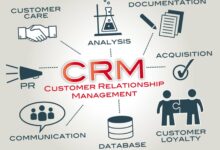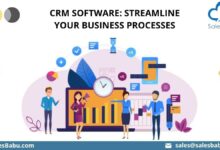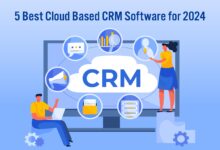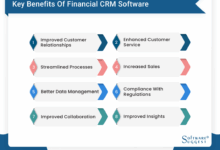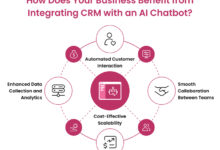AI-Powered CRM Software: Revolutionizing Customer Relationship Management With Artificial Intelligence
At the forefront of modern business strategies lies AI-Powered CRM Software, a game-changer in enhancing customer relationships and optimizing personalized marketing. Dive into the world of artificial intelligence and its transformative impact on CRM systems.
Explore the innovative features, seamless integration, and robust security measures that make AI-powered CRM software a must-have for businesses looking to stay ahead in the competitive market.
Overview of AI-Powered CRM Software
AI-powered CRM software integrates artificial intelligence capabilities into traditional customer relationship management systems to enhance efficiency and effectiveness. By leveraging AI technologies, CRM software can automate tasks, analyze data, and provide personalized insights to improve customer interactions and satisfaction.
AI in CRM Software
Artificial intelligence in CRM software refers to the use of machine learning algorithms and natural language processing to automate processes, predict customer behavior, and personalize interactions. AI can analyze vast amounts of data in real-time to extract valuable insights and optimize customer engagement strategies.
AI Applications in CRM Systems
– Sentiment analysis to understand customer emotions and preferences.
– Predictive analytics to forecast customer needs and trends.
– Chatbots for instant customer support and engagement.
– Lead scoring to prioritize sales opportunities.
– Recommendation engines for personalized product suggestions.
Benefits of AI-Powered CRM Software
– Enhanced customer experience through personalized interactions.
– Increased operational efficiency by automating repetitive tasks.
– Improved sales and marketing effectiveness with predictive analytics.
– Better customer segmentation for targeted marketing campaigns.
– Real-time insights for proactive decision-making.
Data Analysis in AI-Powered CRM
AI-powered CRM software utilizes advanced data analysis techniques to extract meaningful patterns and trends from customer data. By analyzing historical interactions and behaviors, AI can identify opportunities for upselling, cross-selling, and customer retention strategies.
Customization Options in AI-Powered CRM Software
– Customizable dashboards and reports for personalized insights.
– Tailored workflows to align with specific business processes.
– Integration with third-party applications to enhance functionality.
– Scalable architecture to accommodate growing business needs.
Integration Process of AI with Existing CRM Systems
Integrating AI with existing CRM systems involves configuring APIs, data mapping, and testing to ensure seamless connectivity. By connecting AI modules with CRM platforms, businesses can leverage AI capabilities without disrupting their current workflows.
AI Improves Customer Segmentation in CRM
AI-driven customer segmentation allows businesses to categorize customers based on behavior, preferences, and demographics. By segmenting customers accurately, companies can tailor marketing campaigns, offers, and communications to specific target groups, increasing engagement and conversion rates.
Impact of AI on Personalized Marketing Strategies
AI enables personalized marketing strategies by analyzing customer data to deliver relevant and timely messages. By understanding individual preferences and purchase history, businesses can create targeted campaigns that resonate with customers, leading to higher conversion rates and customer loyalty.
Security Measures in AI-Powered CRM Software
To ensure data security and privacy, AI-powered CRM software implements encryption, access controls, and compliance measures. By safeguarding customer information and sensitive data, businesses can build trust with customers and maintain regulatory compliance in handling personal data.
AI-Powered Features in CRM Software
AI-powered CRM software incorporates advanced technologies to enhance customer relationship management. By leveraging artificial intelligence, these systems offer a range of features that revolutionize how businesses interact with their customers.
Key AI Features in CRM Systems
- Automated Data Entry: AI can automatically update and maintain customer records, eliminating the need for manual data entry.
- Lead Scoring and Prioritization: AI algorithms analyze customer data to identify high-value leads, helping sales teams focus on the most promising opportunities.
- Predictive Analytics: AI-driven insights enable businesses to forecast customer behavior and trends, allowing for more proactive decision-making.
- Personalized Recommendations: AI algorithms personalize marketing strategies by recommending products or services based on individual customer preferences.
Comparison of Traditional CRM Features with AI-powered Ones
- Traditional CRM systems rely on manual data entry, while AI-powered systems automate this process for increased efficiency.
- AI-powered CRM software offers predictive analytics capabilities that traditional systems lack, providing valuable insights for strategic decision-making.
- Personalization and recommendation features are more advanced in AI-powered CRM, enhancing customer engagement and satisfaction.
Role of Automation in AI-Powered CRM Software
Automation plays a crucial role in AI-powered CRM software by streamlining repetitive tasks, improving data accuracy, and enhancing customer experiences. By automating processes such as lead nurturing, email campaigns, and customer support, businesses can operate more efficiently and effectively.
Examples of AI Algorithms Used in CRM Systems
- Machine Learning: Algorithms analyze customer data to identify patterns and make predictions about future behavior.
- Natural Language Processing (NLP): NLP enables AI chatbots to understand and respond to customer inquiries in real-time.
- Sentiment Analysis: AI algorithms can analyze customer feedback and sentiment to gauge satisfaction levels and detect potential issues.
Predictive Analytics for Customer Behavior
Predictive analytics in AI-powered CRM software help businesses anticipate customer needs, preferences, and behaviors. By analyzing historical data and trends, organizations can tailor their strategies to meet customer expectations and drive engagement.
Impact of AI on Personalized Marketing Strategies
AI enables businesses to create highly targeted and personalized marketing campaigns by leveraging customer data and behavior insights. By delivering relevant content and offers to individual customers, organizations can increase conversion rates and build stronger relationships.
Benefits of AI Chatbots in CRM for Customer Support
AI chatbots offer immediate assistance to customers, resolving queries and issues in real-time. These virtual assistants enhance customer support by providing 24/7 availability, quick responses, and personalized interactions, ultimately improving customer satisfaction and loyalty.
Implementation of AI in CRM Systems
Implementing AI in CRM software can greatly enhance customer interactions and improve overall business operations. Businesses can follow best practices to successfully integrate AI tools into their existing CRM platforms, leading to increased efficiency and customer satisfaction.
Best Practices for Implementing AI in CRM Software
- Start with clear objectives: Define specific goals for implementing AI in CRM, such as enhancing customer service, improving data analysis, or streamlining workflows.
- Understand your data: Ensure that your CRM system has clean and accurate data to enable AI algorithms to provide meaningful insights.
- Choose the right AI tools: Select AI technologies that align with your business needs and are compatible with your CRM platform.
- Provide proper training: Train your team on how to use AI-powered features effectively to maximize their benefits.
Integrating AI Tools into Existing CRM Platforms
- Identify areas for improvement: Determine which processes in your CRM system can benefit from AI capabilities, such as lead scoring, customer segmentation, or predictive analytics.
- Collaborate with IT professionals: Work closely with your IT team to seamlessly integrate AI tools into your CRM platform without disrupting existing workflows.
- Test and optimize: Conduct thorough testing to ensure the AI features work as intended and continuously optimize them based on feedback and performance data.
Successful AI Implementation in CRM Systems
- Salesforce Einstein: Salesforce has successfully integrated AI capabilities into its CRM platform, enabling users to leverage predictive analytics and personalized recommendations for sales and marketing activities.
- Zoho CRM: Zoho CRM incorporates AI-powered chatbots for customer support, lead scoring algorithms, and sentiment analysis tools to enhance customer engagement and conversion rates.
Potential Challenges and Solutions in Adopting AI-Powered CRM Software
- Challenge: Data privacy concerns – Solution: Implement robust data security measures and comply with regulations to protect customer information.
- Challenge: Resistance to change – Solution: Provide comprehensive training and support to help employees embrace AI technology and understand its benefits.
- Challenge: Integration complexity – Solution: Work with experienced IT professionals and AI experts to ensure smooth integration and minimize disruptions.
Personalization and Customer Experience
In today’s competitive market, providing personalized experiences to customers is essential for businesses to stand out and build strong relationships. AI-powered CRM software plays a crucial role in enhancing personalization and improving overall customer experience.
Enhancing Personalization through AI
AI enhances personalization in customer interactions by analyzing vast amounts of customer data in real-time. This allows businesses to understand individual preferences, behaviors, and purchase history to tailor interactions accordingly. By leveraging AI algorithms, CRM systems can generate personalized recommendations, product suggestions, and offers that are highly relevant to each customer.
- AI analyzes customer data to create personalized recommendations based on individual preferences and behaviors.
- AI-driven personalized marketing strategies improve engagement and conversion rates.
- AI tailors customer journeys in CRM systems to provide a seamless and personalized experience.
Improving Customer Experience with AI
The impact of AI on customer experience in CRM is significant. AI enables businesses to predict customer behavior, segment customers effectively, and deliver personalized experiences in real-time. By understanding customer needs and preferences, businesses can create tailored interactions that drive customer satisfaction and loyalty.
- AI predicts customer behavior for tailored interactions that meet individual needs.
- AI segments customers effectively for personalized marketing campaigns, improving targeting and engagement.
- Real-time data processing by AI enables businesses to deliver personalized customer experiences instantly.
Implementing AI-Driven Personalization Strategies
Implementing AI-driven personalization strategies in CRM systems involves several key steps. Businesses need to identify customer touchpoints, collect and analyze relevant data, train AI algorithms, and continuously optimize personalization efforts based on feedback and results. By leveraging AI technology effectively, businesses can create meaningful and personalized experiences that drive customer satisfaction and loyalty.
Data Management and Analysis
AI plays a crucial role in data management and analysis within CRM software, enabling businesses to make informed decisions based on valuable insights derived from customer data.
AI-Powered Data Management
AI in CRM software automates data entry, cleansing, and organization, ensuring that customer information is accurate and up-to-date. By utilizing machine learning algorithms, AI can identify patterns in data, predict future trends, and recommend personalized actions for each customer.
- AI automates data entry and updates, reducing the risk of human error and ensuring data accuracy.
- Machine learning algorithms analyze large volumes of customer data to identify patterns and trends that can help businesses understand customer behavior.
- AI-powered data management ensures that businesses have a unified view of each customer, enabling personalized interactions and tailored marketing strategies.
AI-Driven Data Analysis
AI enables businesses to analyze customer data at a granular level, extracting valuable insights that can drive strategic decision-making and enhance customer experiences.
- AI algorithms analyze customer interactions across multiple channels to identify trends and patterns that can help businesses anticipate customer needs.
- By leveraging predictive analytics, AI can forecast customer behavior and preferences, enabling businesses to proactively address customer needs and drive engagement.
- AI-powered data analysis provides businesses with actionable insights that can improve customer retention, increase sales, and drive overall business growth.
Integration with Other Business Tools
Integrating AI-powered CRM software with other business tools can bring numerous benefits to organizations looking to streamline their operations and improve overall efficiency. By connecting CRM systems with tools like project management software, accounting software, customer support platforms, and team collaboration tools, businesses can enhance productivity, data accuracy, and customer satisfaction.
Successful Integrations with Accounting Software
Integrating AI-driven CRM systems with accounting software such as QuickBooks or Xero can lead to seamless data flow between sales and finance departments. This integration allows for real-time updates on customer invoices, payment status, and financial transactions, enabling better decision-making and forecasting.
- Automated invoice generation based on CRM data.
- Improved accuracy in financial reporting through synchronized data.
- Enhanced visibility into customer payment history for better credit control.
Streamlining Communication with Customer Support Platforms
AI plays a crucial role in facilitating communication between customer support platforms and CRM tools. By integrating AI capabilities, businesses can automate ticket creation, prioritize customer inquiries based on sentiment analysis, and provide personalized responses in real-time. This integration ensures a seamless flow of information between support teams and sales representatives, leading to faster issue resolution and improved customer satisfaction.
- Automatic creation of support tickets from CRM interactions.
- Sentiment analysis to prioritize and route customer inquiries effectively.
- AI-driven chatbots for instant customer support and query resolution.
Enhancing Collaboration with Team Collaboration Tools
Integrating AI CRM with team collaboration tools like Slack or Microsoft Teams can foster better collaboration and communication within cross-functional teams. By centralizing customer data, communication channels, and project updates in a single platform, teams can work more efficiently, share insights, and coordinate tasks seamlessly.
- Real-time updates on customer interactions and project status.
- Automated notifications for new leads or customer requests.
- Collaborative workspaces for sharing feedback, ideas, and updates.
Scalability and Flexibility
When it comes to AI-powered CRM software, scalability and flexibility are key factors that play a crucial role in adapting to the changing needs of businesses and customers.
Scalability with Business Growth
AI-powered CRM software is designed to scale with business growth by efficiently handling increasing amounts of data and customer interactions. As the business expands, the AI algorithms can adjust to the growing demands, ensuring seamless operations without compromising on performance.
Flexibility in Adapting to Customer Needs
AI offers unparalleled flexibility in adapting to changing customer needs by analyzing data in real-time and providing personalized recommendations or assistance. For example, AI can track customer behavior patterns and adjust the CRM system to cater to individual preferences, enhancing the overall customer experience.
Scalability Challenges and AI Solutions
- Challenge: Managing large volumes of data efficiently.
- Solution: AI algorithms can automate data processing and analysis, enabling businesses to handle massive data sets without delays.
Customizing AI Features for Different Business Sizes
- Small Businesses: Focus on basic AI features like lead scoring and automated responses to streamline operations.
- Medium Businesses: Implement AI for predictive analytics and customer segmentation for targeted marketing strategies.
- Large Enterprises: Utilize AI for advanced data analytics, personalized customer interactions, and predictive modeling for business growth.
Integrating AI into Existing CRM Systems
Integrating AI into existing CRM systems involves assessing the current infrastructure, identifying areas for AI implementation, and gradually introducing AI features to enhance efficiency and customer engagement. This process may require training employees to leverage AI tools effectively.
Automating Personalized Customer Interactions
AI plays a crucial role in automating personalized customer interactions by analyzing customer data, predicting preferences, and tailoring communication strategies accordingly. This leads to improved customer satisfaction and loyalty.
Impact of AI on Data Management and Analysis
AI enhances data management and analysis in CRM systems by automating data entry, cleansing, and segmentation processes. The advanced analytics capabilities of AI enable businesses to extract valuable insights from data for informed decision-making and strategic planning.
Security and Privacy Considerations
Data security is a critical aspect of AI-powered CRM systems, as they handle sensitive customer information. Implementing robust security measures is essential to protect this data from unauthorized access, breaches, or misuse. AI technology plays a significant role in enhancing privacy measures and ensuring the protection of customer data.
Enhanced Data Protection with AI
AI-powered CRM systems leverage advanced technologies to enhance data protection and privacy. These technologies include:
- Encryption: AI algorithms can encrypt customer data, making it unreadable to unauthorized users.
- Behavioral Analytics: AI can analyze user behavior patterns to detect anomalies and potential security threats.
- Access Control: AI helps in managing access control by monitoring and restricting user permissions based on roles and responsibilities.
By using AI technologies like encryption, behavioral analytics, and access control, CRM systems can ensure the security and privacy of customer data.
Ensuring Compliance with Data Privacy Regulations
To comply with data privacy regulations such as GDPR, CCPA, or HIPAA, organizations using AI-powered CRM systems should:
- Implement Data Minimization: Collect and store only necessary customer data to reduce the risk of exposure.
- Regular Audits: Conduct regular audits to ensure data security measures are up to date and effective.
- Transparent Policies: Maintain transparent data privacy policies to inform customers about how their data is used and protected.
Organizations must proactively address data privacy regulations by implementing data minimization practices, conducting regular audits, and maintaining transparent policies.
Training and User Adoption
Training employees on AI-powered CRM software is crucial for successful implementation and utilization. It’s essential to have a structured approach to address challenges related to user adoption and change management. Providing personalized training programs for different user roles within the organization can greatly enhance user engagement with AI features. Incorporating gamification can also help in boosting user adoption of AI-driven CRM software.
Strategies for Training Employees
- Start with a comprehensive orientation session to introduce the AI-powered CRM software and its benefits.
- Provide hands-on training with real-life scenarios to help employees understand how to effectively use the AI features.
- Offer continuous support and resources for employees to refer back to during their learning process.
Successful User Onboarding Examples
- Sales teams can benefit from AI-driven tools that provide personalized recommendations for customer interactions, leading to increased efficiency and sales.
- Customer service representatives can use AI features to quickly access customer data and provide personalized support, resulting in higher customer satisfaction rates.
Measuring and Improving User Engagement
- Track user interactions with AI features to identify areas of improvement and provide additional training where necessary.
- Solicit feedback from employees on their experience with the AI-powered CRM software to make adjustments and enhancements accordingly.
Interactive Training Sessions Guide
- Start by introducing the basic functionalities of the AI-powered CRM software.
- Engage employees in hands-on activities to familiarize them with using AI features in different scenarios.
- Encourage open communication and address any questions or concerns during the training sessions.
Addressing Resistance to Change
- Communicate the benefits of adopting AI-driven tools to employees to help them understand the value it brings to their work.
- Provide ongoing support and resources to address any challenges or uncertainties employees may have during the transition.
AI Ethics and Bias
AI algorithms in CRM systems raise important ethical considerations that need to be addressed to ensure fair and transparent use of AI technology. It is crucial to understand the potential biases that AI-powered CRM systems may introduce and implement strategies to mitigate these biases effectively.
Ethical Considerations in AI for CRM
- Transparency in AI Decision-Making: Organizations should strive to make AI algorithms transparent and understandable to users to build trust and ensure accountability.
- Data Privacy and Security: Safeguarding customer data and ensuring compliance with data protection regulations is essential to maintain ethical standards in AI-powered CRM systems.
- Fairness and Non-Discrimination: It is crucial to ensure that AI algorithms do not discriminate against individuals based on sensitive attributes such as race, gender, or age.
Potential Biases in AI-Powered CRM
- Algorithmic Bias: AI algorithms can inherit biases from the data they are trained on, leading to discriminatory outcomes in customer interactions.
- Confirmation Bias: AI systems may reinforce existing biases by favoring certain types of customers or interactions, potentially limiting diversity and inclusivity.
Mitigation Strategies for AI Bias in CRM
- Diverse and Representative Training Data: Using diverse datasets that represent different customer demographics can help reduce bias in AI algorithms.
- Regular Bias Audits: Conducting regular audits of AI systems to identify and address any biases that may have emerged in customer interactions.
- Human Oversight and Intervention: Implementing human oversight in AI decision-making processes can help prevent biased outcomes and ensure ethical customer interactions.
Ensuring Fairness and Transparency
- Explainable AI: Employing explainable AI techniques can help users understand how AI algorithms arrive at decisions, promoting transparency and accountability.
- Ethical Guidelines and Standards: Organizations should establish clear ethical guidelines and standards for the development and deployment of AI-powered CRM systems to uphold fairness and transparency.
Industry Applications of AI in CRM
AI-powered CRM solutions have revolutionized customer relationship management across various industries, enhancing efficiency, personalization, and overall customer experience. Let’s explore how AI is making a significant impact in different sectors.
Retail Industry
AI in CRM has enabled retailers to analyze customer preferences, predict buying patterns, and offer personalized recommendations. For example, AI-powered chatbots provide instant customer support, while AI algorithms analyze data to optimize inventory management and pricing strategies.
Healthcare Sector
In the healthcare industry, AI-powered CRM systems help in managing patient relationships and improving communication. AI tools assist in scheduling appointments, sending reminders, and analyzing patient feedback to enhance the overall patient experience.
Financial Services
Financial institutions leverage AI in CRM to analyze customer data for personalized financial recommendations and fraud detection. AI algorithms can identify potential risks, predict market trends, and offer tailored financial solutions to customers based on their financial behavior.
Hospitality Sector
Hotels and resorts use AI in CRM to personalize guest experiences, streamline booking processes, and improve customer satisfaction. AI-powered systems can analyze guest preferences, automate check-ins, and provide personalized recommendations for dining and recreational activities.
Automotive Industry
In the automotive sector, AI-powered CRM solutions help in managing customer relationships throughout the vehicle ownership lifecycle. From personalized marketing campaigns to proactive maintenance reminders, AI enables automakers to deliver customized services and enhance customer loyalty.
Challenges and Solutions
While AI brings numerous benefits to CRM in different industries, challenges such as data privacy, integration complexity, and ethical considerations must be addressed. Companies need to ensure data security, seamless integration with existing systems, and ethical AI usage to maximize the benefits of AI in CRM across diverse sectors.
Future Trends in AI-Powered CRM Software
AI-powered CRM software is continuously evolving, incorporating advanced technologies to enhance customer experiences and streamline business processes. One of the key trends shaping the future of CRM is the increasing role of machine learning in delivering personalized interactions with customers. By analyzing vast amounts of data, machine learning algorithms can identify patterns and preferences, enabling businesses to tailor their communication and offerings to individual customers.
Machine Learning for Personalized Customer Experiences
Machine learning algorithms play a crucial role in enhancing personalized customer experiences within CRM systems. By analyzing customer behavior, preferences, and interactions, these algorithms can predict future actions and recommend relevant products or services. This level of personalization not only improves customer satisfaction but also increases customer retention and loyalty.
Integration of Natural Language Processing for Sentiment Analysis
Natural Language Processing (NLP) is being integrated into CRM systems to analyze customer interactions and sentiments more effectively. By understanding the tone and context of customer communications, businesses can identify potential issues, address customer concerns promptly, and improve overall satisfaction. Sentiment analysis powered by NLP enables businesses to respond proactively to customer feedback and enhance the quality of interactions.
Comparative Analysis: Rule-Based Systems vs. AI Algorithms
Comparing rule-based systems with AI algorithms in CRM processes reveals the benefits of using AI for optimization. While rule-based systems rely on predefined instructions, AI algorithms can adapt and learn from data, making them more flexible and capable of handling complex scenarios. AI-driven CRM systems can analyze data in real-time, identify trends, and make data-driven decisions to improve efficiency and effectiveness.
Hyper-Personalization through AI in CRM
Hyper-personalization involves leveraging AI technologies to create highly tailored experiences for individual customers. By analyzing a wide range of data points, including past interactions, preferences, and behaviors, businesses can deliver personalized recommendations, offers, and content in real-time. Hyper-personalization not only enhances customer satisfaction but also boosts engagement and loyalty, leading to better customer retention and lifetime value.
AI-Driven Predictive Lead Scoring for Sales Forecasting
Implementing AI-driven predictive lead scoring models in CRM systems enables businesses to forecast sales more accurately and efficiently. By analyzing historical data, customer behavior, and engagement patterns, AI algorithms can predict the likelihood of leads converting into customers. This predictive capability helps sales teams prioritize leads, optimize their efforts, and ultimately increase conversion rates and revenue.
Case Studies and Success Stories
Implementing AI-powered CRM software has led to remarkable success stories in various businesses. These case studies highlight the positive impact of AI on customer satisfaction, ROI, and overall business outcomes.
Improved Customer Satisfaction through AI Implementations
- A leading e-commerce company integrated AI algorithms into their CRM system to personalize product recommendations for customers. This resulted in a 20% increase in customer satisfaction and a 15% boost in repeat purchases.
- A telecommunications provider utilized AI chatbots to handle customer queries and issues more efficiently. As a result, they saw a 30% reduction in customer service response times and a 25% improvement in customer satisfaction ratings.
ROI and Business Outcomes of Adopting AI in CRM Strategies
- A global retail chain implemented AI-powered CRM analytics to analyze customer data and optimize marketing campaigns. This led to a 25% increase in sales revenue and a 20% decrease in customer acquisition costs.
- An insurance company leveraged AI to automate lead scoring and prioritize high-value leads. This resulted in a 30% increase in conversion rates and a 15% boost in customer retention.
Best Practices from Successful AI CRM Implementations
- Start with clear objectives and goals for AI implementation in CRM systems.
- Ensure proper data quality and integration for accurate AI predictions and insights.
- Provide adequate training and support for employees to maximize the benefits of AI tools.
- Regularly monitor and analyze AI performance to make continuous improvements and optimizations.
Tips for Choosing the Right AI-Powered CRM Software
When selecting AI-powered CRM software for your business, it is crucial to consider various factors to ensure that the chosen solution aligns with your goals and needs. Here are some tips to help you make an informed decision:
Evaluate AI Capabilities
- Check the AI capabilities: Look for features like predictive analytics, natural language processing, and machine learning to ensure the software can enhance customer interactions and decision-making processes.
- Assess data integration: Ensure that the CRM software can seamlessly integrate with your existing systems to provide a unified view of customer data and interactions.
- Consider customization options: Choose a solution that allows for customization based on your specific business requirements to maximize the benefits of AI technology.
Align with Business Goals
- Define your objectives: Clearly outline your business goals and objectives to select a CRM software that can support your strategic initiatives and help achieve desired outcomes.
- Understand scalability: Choose a solution that can scale with your business growth to ensure long-term success and avoid the need for frequent software changes.
- Focus on user-friendliness: Prioritize user experience and ease of use to encourage adoption among employees and maximize the benefits of AI-powered features.
Vendor Support and Training
- Assess vendor support: Evaluate the level of support provided by the CRM software vendor, including training, implementation assistance, and ongoing customer service to address any issues or concerns.
- Consider training options: Look for vendors that offer comprehensive training programs to help users effectively utilize the AI-powered features and maximize the software’s potential.
- Stay updated on developments: Choose a vendor that is committed to continuous development and improvement of their AI-powered CRM software to ensure you stay ahead of industry trends and technological advancements.
Final Wrap-Up
In conclusion, AI-Powered CRM Software offers a glimpse into the future of customer relationship management, paving the way for more efficient processes, data-driven insights, and unparalleled customer experiences. Embrace the power of AI to elevate your CRM strategies and drive business growth in the digital age.
